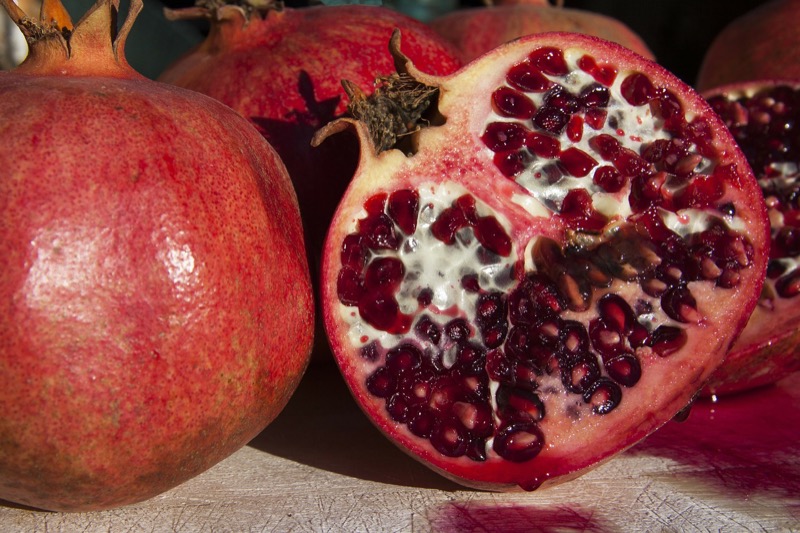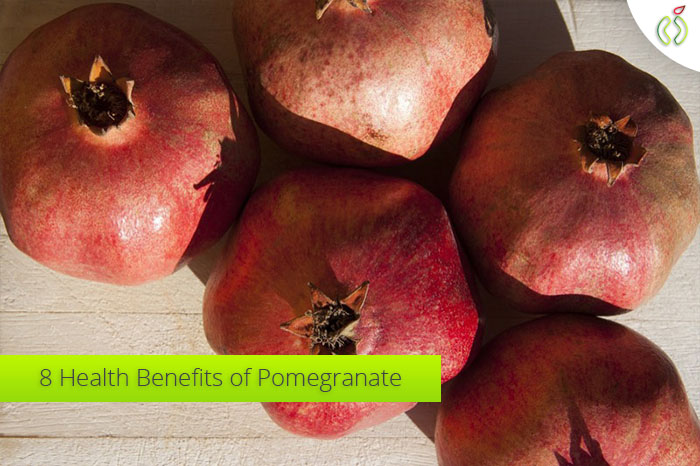Did you know that a glass of pomegranate juice has more antioxidants than cranberries, red wine and green tea?
Categorized as a berry, pomegranate is a round, red fruit that looks like a small apple but with a flower-shaped stem. The flavonoid anthocyanin is responsible for its red skin and juice color. Pomegranate is composed of the pericarp or the peel which is thick and inedible, the seeds, and the aril or the outer layer that surrounds the seeds. The arils and the crunchy seeds are the edible portions of a pomegranate. .
Pomegranate is a Middle Eastern superfruit that is nutrient-dense. Known as the “fruit of paradise” in ancient cultures, pomegranate is traditionally considered as a symbol of health. Several herbal medicinal and Ayurvedic scriptures mention the use of this fruit as a natural medicine. Pomegranates are indeed packed with antioxidants, fiber, vitamins A, C, K and E, and iron. This fruit has high levels of flavonoids and polyphenols which are potent phytochemicals that act as antioxidants that protect your cells from free radical damage. Bet you didn’t know that there are 122 phytochemicals identified in pomegranate.
Scientific studies have already proven the health claims made about pomegranate. Here are eight of the many proven health benefits of this superfruit. These should be enough to convince you that you should include this ruby-red jewel of a fruit in your diet.
Benefit #1: Pomegranates can help prevent heart disease
Punicalagin is a compound found only in pomegranates and this compound lowers cholesterol, triglycerides and blood pressure. Because pomegranates are rich in antioxidants, they can effectively inhibit the oxidization of bad cholesterol or LDL.
It benefits the heart and blood vessels as it speeds up the process of melting away heart blockages (atherosclerosis). The antioxidants found in pomegranate are sufficient to decrease the inflammation and thickening of the artery walls. By keeping blood circulation in order, buildup of plaque is reduced therefore you get a decreased risk of heart attack and stroke. Pomegranate can also supply iron to the blood hence reducing symptoms of anemia.
A study published at the Clinical Nutrition Journal in 2004 resulted to 30% reduction in atherosclerotic plaque of heart patients with severe carotid artery blockages who were given an ounce of pomegranate juice each day for one year. The participants’ blood pressure also lowered by 12%. The participants who did not take the pomegranate juice had a 9% increase in their atherosclerotic plaque.

Included in Nutrition Reviews, an international and peer-reviewed journal, is the 2009 study on pomegranate juice as a heart-healthy fruit juice. The review supports the cardio-protective benefits of pomegranate juice.
Benefit #2: It can slow the progress of prostate cancer and inhibit colon cancer, leukemia and breast cancer
Pomegranates are not only beneficial in keeping your heart healthy; they also protect you from the deadly cancer diseases. Studies using laboratory animals showed the remarkable anti-cancer effect of pomegranates as it can prevent vascular changes that encourage the growth of tumors. A study published by the National Cancer Institute provided information on how the bioactive components of pomegranate juice and extract can promote cancer cell death and decrease cancer cell proliferation.
Several clinical studies have been made to prove the cancer-fighting benefits of pomegranate. In fact, clinical trials are now being done on prostate cancer pills with pomegranate extract as well as pomegranate juice and pomegranate liquid extract.
Benefit #3: Pomegranates strengthen your bones and help prevent osteoporosis and osteoarthritis
Lactose intolerant? Take pomegranate juice and get the same bone-strengthening benefit as that of milk. A study published in the Journal of Ethnopharmacology in 2004 concluded that pomegranate extracts can indeed prevent bone loss particularly in menopausal women. Pomegranates are rich in manganese which is essential in bone care. The polyphenol antioxidants in pomegranate can also reduce bone deterioration. So for better calcified bones, consider pomegranates.
Benefit #4: Pomegranates can calm stomach disorders and cure digestive problems
Pomegranate has been used hundreds of years ago as herbal treatment for cholera and dysentery. The peel of organic pomegranates can be boiled to make a tea which can calm disorders of the stomach like diarrhea.
As good as your trusted loperamide is the pomegranate fruit. Many clinical investigations have studied the antidiarrheal activity of water and alcohol extracts of pomegranate fruit rind. If your stomach is upset, eat pomegranates and see how it can easily decrease the number of times you have to go to the toilet.
Pomegranates are also good for your gut flora. This tannin-rich fruit can promote the formation of good bacteria.
We also know how a fiber-rich diet can improve your digestive system and pomegranates are rich in fiber. A single pomegranate fruit has about 20-35g of fibers which means you only need one pomegranate to fulfill 45% of your daily recommended fiber intake.
Benefit #5: It can improve your oral health by preventing dental plaque formation
The juice of pomegranates has outstanding antibacterial and antiviral properties making it a delicious and nutritious mouthwash that you can actually swallow. No, you don’t have to gargle pomegranate juice it in your mouth of course (that’s a bit disgusting, you know). Eating pomegranate fruit as a food could supply your mouth and gum areas with antioxidant and antibacterial agents.
Alternatively, you can scour the shelves of the health and beauty section of department stores and groceries to find oral care products formulated with pomegranate extracts. Nowadays, you can find gels, toothpaste, mouthwash and other dental care products with pomegranate extract as its winning ingredient. Several studies have already confirmed that pomegranate extracts, whether found in a toothpaste or a mouthwash, can inhibit gingivitis development and denture-related oral diseases. Rinsing your mouth with pomegranate extracts can also lower saliva activities that could promote growth of bacteria. A 1-minute rinse using a mouthwash with pomegranate extracts can also reduce the amount of microorganisms that developed from dental plaque.

A study published on the Journal of Herbal Pharmacotherapy in 2006 provided evidence that the hydroalcoholic extract or HAE from pomegranate can effectively fight dental plaque microorganisms. The antibacterial activity presented by the extracts from Punica granatum (pomegranate) indicated that pomegranate HAE may be an alternative treatment for dental plaque bacteria.
So protect your mouth against various oral diseases and reduce the effects of dental plaque by increasing your intake of pomegranate fruit or juice and by using dental care products with pomegranate extracts as its active ingredient.
Benefit #6: It can effectively help you manage psychological stress
Pomegranates are not just good for your physical body because they are also known to be beneficial in maintaining your mental and emotional health. Pomegranates contain phytochemical compounds that stimulate estrogen receptors and serotonin production therefore improving your mood.
Researchers from Queen Margaret University in Edinburgh conducted a study and they found out that the 60 volunteers who drank 500ml of pomegranate juice daily for two weeks had lower levels of the stress hormone cortisol. This hormone is released by the adrenal gland as a response to stress. Excessive levels of cortisol can lead to high blood pressure and insulin resistance.
Benefit #7: Pomegranates can help keep Alzheimer’s at bay
You wouldn’t want to be someone who will forget the name of your own children, right? Include pomegranate in your daily diet and reduce your risk of having Alzheimer’s. Researchers say that pomegranate play an important role in the prevention and treatment of this disease. How pomegranate juice can cut Alzheimer’s risk, you may ask. Dr. Richard Harman, the lead researcher of the study released by Loma Linda University in 2006, reports that pomegranates’ high level of polyphenols effectively neutralizes the harmful effects of free radicals which can trigger Alzheimer’s disease. Their experiment showed that continuous consumption of pomegranate juice or pomegranate fruit can keep plaques from accumulating in the brain. Such accumulation can damage brain cells which could trigger memory loss and cognitive relapse; both of these are signs of Alzheimer’s disease.
The anti-inflammatory properties of pomegranate also help fight this disease. Clinical studies have already confirmed that chronic brain inflammation is a known factor that accelerates the progress of Alzheimer’s. The phenolic compound punicalagin which is present in pomegranates can prevent the inflammation of specialized brain cells. This, in turn, could prevent the destruction of the cells of the brain. And because pomegranate juice contains about 3.4% of punicalagin, regular consumption of pomegranate juice can help prevent neuro-inflammation related to dementia.
Benefit #8: Pomegranates can keep your skin healthy
Achieve that youthful and growing skin by increasing your intake of pomegranate. The antioxidants in this fruit can free your skin of toxins that make your skin looking dull. A study done in 2006 also provided evidence that the pomegranate aqueous extracts, particularly those from the peel, promote dermis regeneration. Pomegranate seed oil, on the other hand, promotes regeneratio of the epidermis. Another study in 2008 described the protective effects of pomegranate polyphenols against UVA and UVB-induced skin cell damage. This could be the reason why more and more skincare products are being formulated with pomegranate extracts.
A pomegranate-based ointment was formulated to test the anti-inflammatory and antibacterial properties of pomegranate extracts. The experiment showed that the pomegranate extract exhibited significant antibacterial activity against wound bacteria. The extracts from the flowers of pomegranate also exhibited potential in boosting wound healing.
There are many other health benefits associated with the consumption of pomegranate fruit or juice. We’ve outlined eight and provided you with reliable clinical findings to support the health benefit claims. The number of research that establish the health benefits of pomegranate only tells us one thing: that pomegranate is one fruit you can’t afford to exclude from your diet.

Although this fruit is native to Asia, it is widely cultivated throughout the world. That’s a super good news about this super fruit for we can easily find it in groceries. Fresh pomegranates are available in most supermarkets from September through January, but you can always buy 100% pomegranate juice all year round. You can refrigerate the ones you bought fresh for about 2 months.
Since the ancient times, pomegranate is considered as a healing fruit. Throughout the years, this fruit continues to display functional and medicinal effects, regardless of which part of the fruit you use. The peel itself contains numerous bioactive compounds including flavonoids and minerals like sodium, potassium and magnesium. The arils contain bioactive compounds too and also water. A cup of arils contains about 30% of Vitamin C RDA, 16% of Folate RDA, 12% of Potassium RDA, and 36% of Vitamin K RDA.
So the next time you go grocery shopping, don’t forget to include pomegranate juice or fresh pomegranates in your basket. Choose those that are appropriately weighty for their size with taut, glossy, and unbroken soft skin. The ripe ones are the deep red pomegranates that make a metallic sound when tapped and its sides become flattened.
How much do you need to consume to enjoy the benefits? Research has shown that only two ounces of pomegranate juice per day is enough to experience some significant heart health benefits. Healthy individuals should aim for 1-2 glasses per day, ideally.
With the accumulating research on the health benefits provided by pomegranate, there’s no reason for us not to believe that it is indeed a healing fruit.
It’s delicious, relatively inexpensive, not too hard to find, and has incredible benefits for your health. You’d do yourself more good than harm if you add more pomegranate into your diet. How? Well, you can include pomegranate in your meal plan by:
- preparing a fresh pomegranate juice in the morning
- tossing some pomegranate seeds into your salad for added texture, color, and nutrition
- making a pomegranate guacamole
- garnishing your soup with pomegranate seeds
- preparing a pomegranate cooler with pomegranate juice, seltzer water, fresh lemon and some mint
- serving your turkey dish with cranberry pomegranate sauce
- adding pomegranate seeds in your Greek yogurt snack or dessert
Seeding a pomegranate may be messy but the mess is sure to be worth it.
Do you use pomegranate in your daily nutrition plan? Let us know about it






